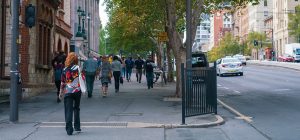With hearings underway to review the success of Sydney’s late-night measures, the people of NSW want their government to stand firm, with more than four in five residents supporting a closing time for pubs, clubs and bars of no later than 3am.
New polling conducted by YouGov Galaxy shows overwhelming public support for the measures, including last drinks and last entry, which have drastically reduced violence and serious injuries in Sydney’s entertainment precincts over the past five years.
The poll findings were presented to the Review Committee today by representatives of the NSW/ACT Alcohol Policy Alliance (NAAPA) – the State’s leading coalition of health professionals, emergency and law enforcement services, community members and researchers.
NAAPA spokesperson, Foundation for Alcohol Research and Education (FARE) Chief Executive Michael Thorn says the poll findings challenge and override the noisy, narrow opposition to the measures and support NAAPA’s call for the current suite of measures to be retained in their entirety.
“The NSW Government can be confident it has achieved the right policy settings knowing that 84 per cent of people support a closing time for pubs, clubs and bars of no later than 3am”.
The YouGov Galaxy poll also found:
- 76 per cent of NSW residents believe more needs to be done to prevent alcohol harm
- 71 per cent support stopping the sale of alcohol 30 minutes before closing time
- 73 per cent support ID scanners
- 63 per cent support placing a limit of four drinks on the number of drinks a person can purchase at one time after 10pm.
“There is also widespread support for the policies among young people with 90 per cent of 18-34 year olds supporting a closing time for pubs, clubs and bars of no later than 3am,” Mr Thorn said.
NAAPA’s submission to the Joint Select Committee on Sydney’s Night Time Economy, says the poll results are proof the balance is right for Sydney’s long-term future as a vibrant city.
“Altering, diluting or terminating these measures would be directly at odds with community sentiment and would disregard their concerns and opinions,” Mr Thorn said.
“Not only have the measures reduced alcohol harm, they have encouraged a positive shift in culture as the night-time economy expands and flourishes in a healthier, safer environment,” he said.
A recent Deloitte report also found there has been a shift away from narrowly equating ‘vibrancy’ with 24-hour access to alcohol.
“The broader Sydney community agrees that their vibrant, inclusive and prosperous nightlife is no longer dependent on the dangerous oversupply of alcohol,” Mr Thorn said.
The NAAPA coalition has concerns that Sydney still has a very dark mark that needs to be addressed, and its submission recommends the successful late-night measures be rolled out across the greater Sydney region.
“Assault rates in Sydney remain higher than the state average; but worse, there is a devastating increase in alcohol-related sexual offences occurring on weekends,” Mr Thorn said.
“While ever this horrific pattern of violence continues, there will never be a right time to weaken Sydney’s late-night measures and backslide to indulging the vested interests of the alcohol industry over the health and safety of the people,” he said.






